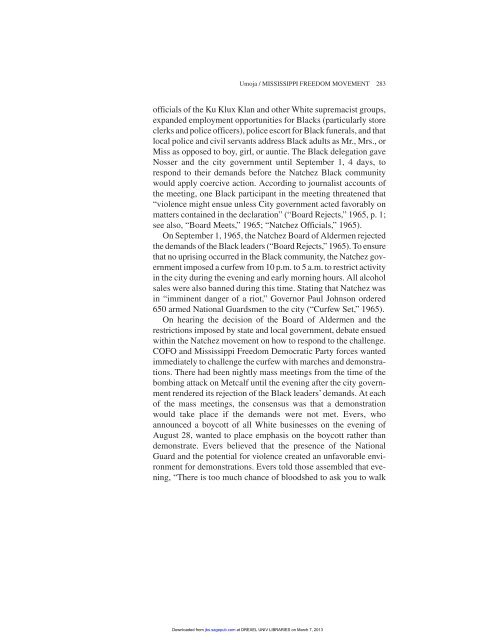MXGM Self-Defence Manual
MXGM Self-Defence Manual
MXGM Self-Defence Manual
Create successful ePaper yourself
Turn your PDF publications into a flip-book with our unique Google optimized e-Paper software.
Umoja / MISSISSIPPI FREEDOM MOVEMENT 283<br />
officials of the Ku Klux Klan and other White supremacist groups,<br />
expanded employment opportunities for Blacks (particularly store<br />
clerks and police officers), police escort for Black funerals, and that<br />
local police and civil servants address Black adults as Mr., Mrs., or<br />
Miss as opposed to boy, girl, or auntie. The Black delegation gave<br />
Nosser and the city government until September 1, 4 days, to<br />
respond to their demands before the Natchez Black community<br />
would apply coercive action. According to journalist accounts of<br />
the meeting, one Black participant in the meeting threatened that<br />
“violence might ensue unless City government acted favorably on<br />
matters contained in the declaration” (“Board Rejects,” 1965, p. 1;<br />
see also, “Board Meets,” 1965; “Natchez Officials,” 1965).<br />
On September 1, 1965, the Natchez Board of Aldermen rejected<br />
the demands of the Black leaders (“Board Rejects,” 1965). To ensure<br />
that no uprising occurred in the Black community, the Natchez government<br />
imposed a curfew from 10 p.m. to 5 a.m. to restrict activity<br />
in the city during the evening and early morning hours. All alcohol<br />
sales were also banned during this time. Stating that Natchez was<br />
in “imminent danger of a riot,” Governor Paul Johnson ordered<br />
650 armed National Guardsmen to the city (“Curfew Set,” 1965).<br />
On hearing the decision of the Board of Aldermen and the<br />
restrictions imposed by state and local government, debate ensued<br />
within the Natchez movement on how to respond to the challenge.<br />
COFO and Mississippi Freedom Democratic Party forces wanted<br />
immediately to challenge the curfew with marches and demonstrations.<br />
There had been nightly mass meetings from the time of the<br />
bombing attack on Metcalf until the evening after the city government<br />
rendered its rejection of the Black leaders’ demands. At each<br />
of the mass meetings, the consensus was that a demonstration<br />
would take place if the demands were not met. Evers, who<br />
announced a boycott of all White businesses on the evening of<br />
August 28, wanted to place emphasis on the boycott rather than<br />
demonstrate. Evers believed that the presence of the National<br />
Guard and the potential for violence created an unfavorable environment<br />
for demonstrations. Evers told those assembled that evening,<br />
“There is too much chance of bloodshed to ask you to walk<br />
Downloaded from jbs.sagepub.com at DREXEL UNIV LIBRARIES on March 7, 2013


